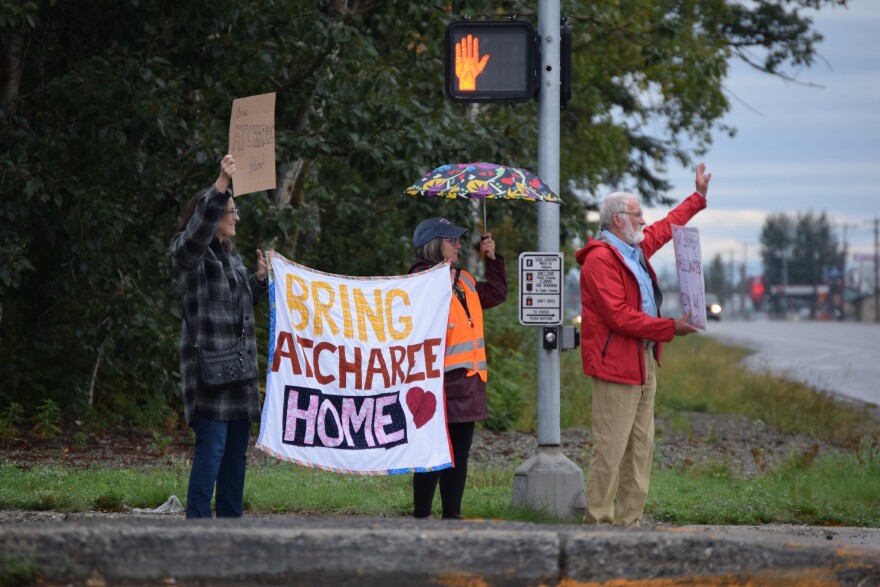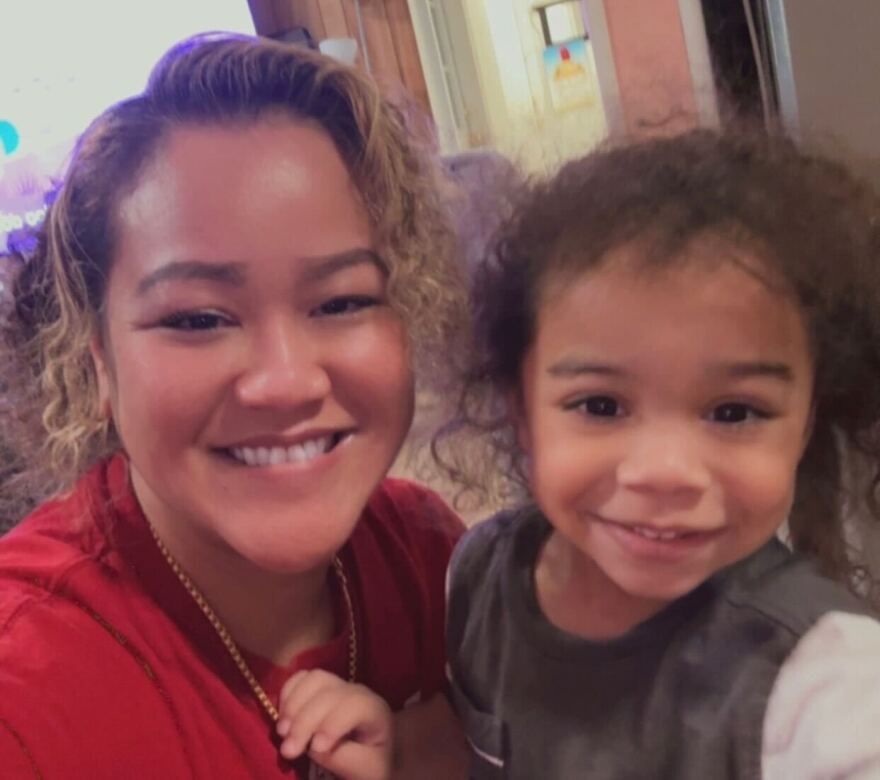On a sunny afternoon in early August, Atcharee Buntow was running an errand for her mom's Thai restaurant, topping off their supply of oyster sauce. But when an unmarked vehicle pulled her over on her way home, it became one of the worst days of her life.
A U.S. Immigrations and Customs Enforcement agent approached her car, and Buntow started taking a video of the encounter on her phone while frantically trying to text her family.
Buntow says she didn't know what was happening until after the agent put her in handcuffs.
"They did not identify themselves until they had me in custody," she said in an interview after her release.
Buntow said she was told that she was being detained for overstaying her visa and then taken to a holding facility in Tacoma, Washington. She said she was locked in a dorm with about 60 other women, where it was hard to sleep and meals didn't come on time.
"Some nights, we didn't get our dinner till 10:30 p.m., or 11," she said. "The latest night I ever got dinner was at 2:30 a.m., so I just starved that night,"
She was released on bail about two months later, on Oct. 2.
Buntow, who turns 43 this week, was born in Thailand but has lived in the United States since she was 11. She said she wasn't aware that there had been any issue with her immigration status, especially after she got married to her first husband, an American citizen.
She's now married to a different American citizen and is the mother of six American children — four adults and two younger kids. She said the separation was hardest for them.
"My 12-year-old, he was in and out of the hospital for asthma attacks," Buntow said. "Now that I'm back, he is fine."
She also has a two-year-old son who relatives say would cry every night she was gone.
Buntow stayed in touch with family with a tablet she shared with dozens of other women in the detention center. She said those brief calls were one of her only sources of comfort behind bars.
"I was depressed," Buntow said. "You know, what are they going to do for Thanksgiving? I cook every year. Mac and cheese, sweet potato pie and the green bean casserole. The kids love that."
Buntow said she feels like her arrest was pretty random. But she's been convicted of a few nonviolent misdemeanors in Fairbanks over the last couple decades, as well as a felony for fraudulently applying for the Alaska Permanent Fund dividend, according to court records.
She pleaded guilty to falsely claiming U.S. citizenship on her PFD application in 2014. Buntow said that was a mistake she made while she was filling out the PFD paperwork for her children. Now, she's trying to get the conviction vacated so she can stay in Alaska with her family.
Over the last couple months, Buntow's friends and neighbors, Fairbanks officials, and state legislators advocated for her release. Fairbanksans held a protest in her honor, and her family was able to crowdfund over $20,000 for her bail.
Buntow said the fundraiser remains active to help cover her legal fees while she tries to secure a green card.

Margaret Stock, an Anchorage-based attorney who is recognized for her expertise in immigration law, said she's seen many people in Alaska face similar situations this year. And that while the Trump administration insists ICE agents are only picking up the worst of the worst, she sees a lot of collateral damage.
"What I'm seeing are a lot of people being picked up who don't have a criminal record," Stock said. "Or it's something really minor, like they had an encounter with the police, but no charges were filed. In some cases, they're picking up U.S. citizens."
Stock said she's even working with an Alaska military veteran to fight deportation proceedings. She said the majority of people she sees ICE detaining are eligible for a green card, and that she believes ICE is putting pressure on them to leave the country by putting them in detention centers.
But those proceedings can take years. And Stock said legal resources are stretched thin, especially in Alaska.
"It's pretty hard to find help," she said. "I mean, there are a few private lawyers, but we're strapped thin. Right now, the immigration judges have more than 4,000 cases per judge. Getting a hearing with the judge can take a really long time, and you have to comply with a lot of technical rules, so it's really difficult if you don't have an attorney."
That's the route Buntow is trying to take. Buntow said she's cautiously hopeful she won't be deported to Thailand, which doesn't feel like home anymore.
"I don't know anything over there," she said. "I've been living here all my life. Where would I live? Where would I go? What will I do without my kids, my husband? I'm happy that I'm back, I'm just scared of what's going to happen next."
Her husband, an American citizen who has never left the country before, is preparing to start his life over with her abroad if their worst fears come to pass.
Buntow remains grateful for the time she has with her family and the chance to celebrate her birthday and the holidays together. But her thoughts remain with the other mothers she befriended in the Tacoma detention center.
Buntow is still in touch with a fellow detainee named Paula, an immigrant from the Philippines who was born in Cambodia.
"I just heard Paula got sent to Louisiana, which is worse than Tacoma," Buntow said. "She has eight children. She's been in there for 18 months, and her immigration case is over. She was trying to appeal it, and they denied her appeal. I really feel very bad for her. Like, I cried when she told me her story."
ICE did not respond to interview requests before press time.
Copyright 2025 KUAC


